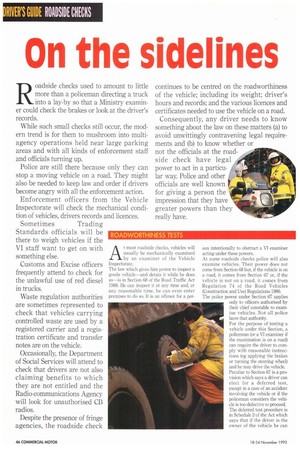On the sidelines
Page 48

If you've noticed an error in this article please click here to report it so we can fix it.
Roadside checks used to amount to little more than a policeman directing a truck into a lay-by so that a Ministry examiner could check the brakes or look at the driver's records.
While such small checks still occur, the modern trend is for them to mushroom into multiagency operations held near large parking areas and with all kinds of enforcement staff and officials turning up.
Police are still there because only they can stop a moving vehicle on a road. They might also be needed to keep law and order if drivers become angry with all the enforcement action.
Enforcement officers from the Vehicle Inspectorate will check the mechanical condition of vehicles, drivers records and licences.
Sometimes Trading Standards officials will be there to weigh vehicles if the VI staff want to get on with something else.
Customs and Excise officers frequently attend to check for the unlawful use of red diesel in trucks.
Waste regulation authorities are sometimes represented to check that vehicles carrying controlled waste are used by a registered carrier and a registration certificate and transfer notes are on the vehicle.
Occasionally, the Department of Social Services will attend to check that drivers are not also claiming benefits to which they are not entitled and the Radio-communications Agency will look for unauthorised CB radios.
Despite the presence of fringe agencies, the roadside check continues to be centred on the roadworthiness of the vehicle; including its weight; driver's hours and records; and the various licences and certificates needed to use the vehicle on a road.
Consequently, any driver needs to know something about the law on these matters (a) to avoid unwittingly contravening legal requirements and (b) to know whether or not the officials at the roadside check have legal power to act in a particular way. Police and other officials are well known for giving a person the impression that they have greater powers than they really have.




















































































































